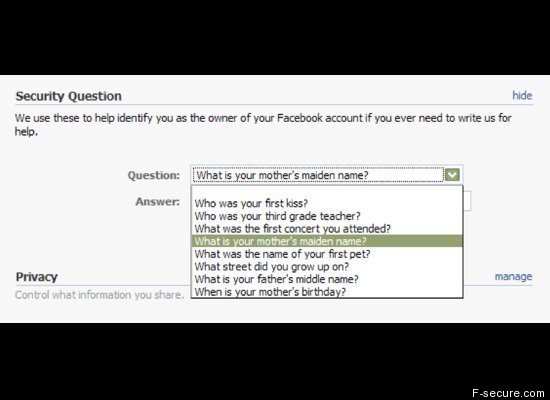eenjoy social networking but not at the expense of your own security. Know some important things you should never post on social networking sites.
So here are some points to keep in mind. What is not allowed to post on Facebook?
1). Your Place and Date of Birth:
 |
While it may be nice to hear from Facebook well-wishers on your birthday, you should think twice before posting your full birthday. Beth Givens, executive director of Privacy Rights Clearinghouserecommend that disclosing your exact date of birth and your place of birth is like leaving your financial security to thieves. Furthermore Carnegie Mellon researchers recently have found that they can reconstruct a social security number using a person’s date of birth and place of birth.
Instead of erasing your birthday entirely, you can enter a date that is only a few days away from your actual birthday.
2). Your Mother’s Maiden Name:
 |
“Your mother’s maiden name is invaluable information, not least because it is often the answer to security questions on many websites,” he wrote. New York Time. Credit card companies, your wireless service provider, and many other companies often rely on this tidbit to protect your personal information.
3). Your Home Address :
 |
Publishing your home address allows everyone and anyone with whom you share the information to see where you live, from your ex to your employer. Opening up in this way can have negative repercussions: for example, there are instances where thieves have used Facebook to target users who said they were not at home.
4). Your Long Journey Away From Home:
 |
Don’t post status updates mentioning when you’ll be away from home,recommendNew York Time columnist Ron Lieber. When you broadcast a vacation date, you might be telling untrustworthy Facebook “friends” that your house is empty and unattended. “[R]remind ‘friends’ that you have an alarm or guard dog,” wrote Lieber.
5). Your Short Trip Away From Home :
 |
While new features like Facebook Places encourage you to check-in on your trip and broadcast your location (whether in a restaurant, park, or store), you might think twice before even sharing information about shorter departures from your home. “Don’t post messages like ‘out for a run’ or ‘shopping at the mall for my love,’” 911 Identity Theft warning. “Thieves can use that information to physically break into your home.”
6). Your phone number :
 |
Pay attention to where you post your phone number. Include it on your profile and, depending on your privacy settings, even your most distant Facebook “friends” (think exes, elementary school contacts, friends of friends) might be able to access it and give you a ring. Sharing it with Facebook Pages can also get you into trouble. Developer Tom Scott created an app called Crime which displays a phone number published anywhere on Facebook. According to Scott, “There are tons of groups on Facebook called ‘lost my phone!!!!! need your number!!!!!’ […] Most are marked as ‘public’, and many people don’t understand what that means in the context of Facebook — to Facebook, ‘public’ means everyone in the world, whether they’re a member of Facebook or not.”
7). Your Child’s Name :
 |
Identity thieves also target children. “Don’t use the child’s name in the photo tag or description,” write Consumer reports. “If someone else did, remove it by clicking Remove Tag. If your child isn’t on Facebook and someone includes their name in the description, ask that person to remove their name.”
8). Your Profile In General Search :
 |
Do you want your Facebook profile – even simple information like your gender, name and profile picture – to show up in Google searches? Otherwise, you should block your profile from showing up in search engine results. Consumer reports recommend that doing so will “help prevent strangers from accessing your page”. To change these privacy settings, go to Privacy Settings under Account, then Share on Facebook.
Source : The Huffington Post








